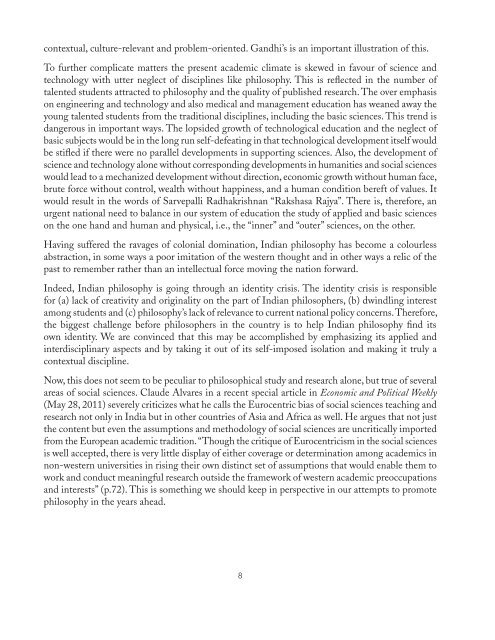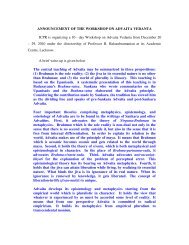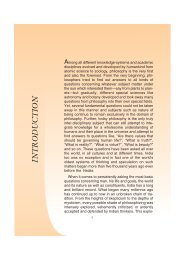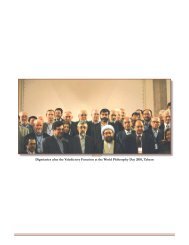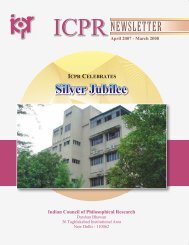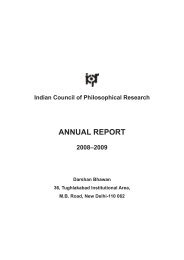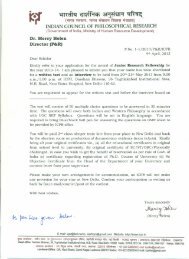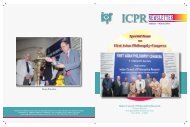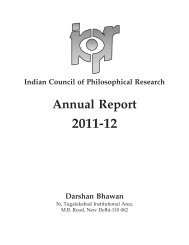(2010- 2011) English - Indian Council of Philosophical Research
(2010- 2011) English - Indian Council of Philosophical Research
(2010- 2011) English - Indian Council of Philosophical Research
You also want an ePaper? Increase the reach of your titles
YUMPU automatically turns print PDFs into web optimized ePapers that Google loves.
contextual, culture-relevant and problem-oriented. Gandhi’s is an important illustration <strong>of</strong> this.<br />
To further complicate matters the present academic climate is skewed in favour <strong>of</strong> science and<br />
technology with utter neglect <strong>of</strong> disciplines like philosophy. This is reflected in the number <strong>of</strong><br />
talented students attracted to philosophy and the quality <strong>of</strong> published research. The over emphasis<br />
on engineering and technology and also medical and management education has weaned away the<br />
young talented students from the traditional disciplines, including the basic sciences. This trend is<br />
dangerous in important ways. The lopsided growth <strong>of</strong> technological education and the neglect <strong>of</strong><br />
basic subjects would be in the long run self-defeating in that technological development itself would<br />
be stifled if there were no parallel developments in supporting sciences. Also, the development <strong>of</strong><br />
science and technology alone without corresponding developments in humanities and social sciences<br />
would lead to a mechanized development without direction, economic growth without human face,<br />
brute force without control, wealth without happiness, and a human condition bereft <strong>of</strong> values. It<br />
would result in the words <strong>of</strong> Sarvepalli Radhakrishnan “Rakshasa Rajya”. There is, therefore, an<br />
urgent national need to balance in our system <strong>of</strong> education the study <strong>of</strong> applied and basic sciences<br />
on the one hand and human and physical, i.e., the “inner” and “outer” sciences, on the other.<br />
Having suffered the ravages <strong>of</strong> colonial domination, <strong>Indian</strong> philosophy has become a colourless<br />
abstraction, in some ways a poor imitation <strong>of</strong> the western thought and in other ways a relic <strong>of</strong> the<br />
past to remember rather than an intellectual force moving the nation forward.<br />
Indeed, <strong>Indian</strong> philosophy is going through an identity crisis. The identity crisis is responsible<br />
for (a) lack <strong>of</strong> creativity and originality on the part <strong>of</strong> <strong>Indian</strong> philosophers, (b) dwindling interest<br />
among students and (c) philosophy’s lack <strong>of</strong> relevance to current national policy concerns. Therefore,<br />
the biggest challenge before philosophers in the country is to help <strong>Indian</strong> philosophy find its<br />
own identity. We are convinced that this may be accomplished by emphasizing its applied and<br />
interdisciplinary aspects and by taking it out <strong>of</strong> its self-imposed isolation and making it truly a<br />
contextual discipline.<br />
Now, this does not seem to be peculiar to philosophical study and research alone, but true <strong>of</strong> several<br />
areas <strong>of</strong> social sciences. Claude Alvares in a recent special article in Economic and Political Weekly<br />
(May 28, <strong>2011</strong>) severely criticizes what he calls the Eurocentric bias <strong>of</strong> social sciences teaching and<br />
research not only in India but in other countries <strong>of</strong> Asia and Africa as well. He argues that not just<br />
the content but even the assumptions and methodology <strong>of</strong> social sciences are uncritically imported<br />
from the European academic tradition. “Though the critique <strong>of</strong> Eurocentricism in the social sciences<br />
is well accepted, there is very little display <strong>of</strong> either coverage or determination among academics in<br />
non-western universities in rising their own distinct set <strong>of</strong> assumptions that would enable them to<br />
work and conduct meaningful research outside the framework <strong>of</strong> western academic preoccupations<br />
and interests” (p.72). This is something we should keep in perspective in our attempts to promote<br />
philosophy in the years ahead.<br />
8


